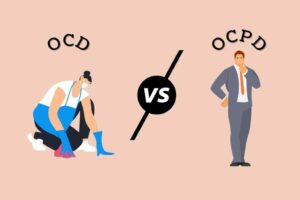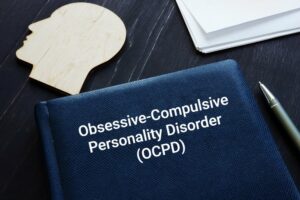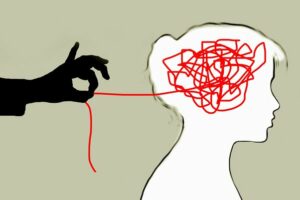Do you know someone who is always neat and tidy, and can never seem to relax? They may be suffering from obsessive-compulsive personality disorder, popular by the acronym OCPD. This condition is characterized by a need for perfectionism and control, along with symptoms like intrusive thoughts and compulsive behaviors. In this blog post, we will discuss the causes, symptoms, and treatment options for OCPD.
Contents
Defining Obsessive-Compulsive Personality Disorder
OCPD, a popular acronym for obsessive-compulsive personality disorder, is a Cluster-C type personality disorder. This means that it shares characteristics with other disorders in the cluster, like avoidant personality disorder and dependent personality disorder. All three conditions are characterized by anxiety and fearfulness.
As its name suggests, OCPD is partially defined by obsessions and compulsions. Obsessions are intrusive thoughts that cause anxiety or distress. Compulsions are behaviors or mental rituals that a person uses to try to relieve their anxiety. However, these compulsions only provide temporary relief and can actually make the obsessions worse over time.
Since OCPD is a personality disorder, it can be much more difficult to treat than other conditions. This is because personality disorders are deeply ingrained patterns of thinking and behaving. Treatment often requires rigorous and long-term psychotherapy to help a person change their thought patterns and behaviors.
OCPD v/s OCD: What’s The Difference?
You may be thinking of obsessive-compulsive personality disorder being the same thing as OCD. This is a common misunderstanding which may be due to the similar acronyms and symptoms. However, there are some key differences between OCPD and OCD.

The main difference is that people with OCD have insight into their condition. This means that they realize that their obsessions and compulsions are excessive or unreasonable. People with OCPD do not usually have this insight. They may believe that their need for perfectionism and control is normal.
Another difference is that people with OCD tend to avoid situations that trigger their obsessions. For example, a person with OCD who is afraid of germs may avoid shaking hands or going outside. People with OCPD are more likely to face their triggers head-on. This may be because they feel like they need to prove something to themselves or others.
Another major difference is that people with OCD usually recognize that their thoughts and behaviors are excessive. People with OCPD may not see anything wrong with their thought patterns and behaviors. In fact, they may see them as positive qualities. This can make OCPD much more difficult to treat than OCD.
Signs And Traits
There are a few key signs and traits that may be indicative of obsessive-compulsive personality disorder. These include:

- Perfectionism: This may manifest itself in the need to have everything just so, or an excessive focus on details.
- Inflexible morality: This is a very tricky and sensitive issue, as it can be difficult to discern whether someone is simply holding themselves to a high moral standard, or if they are being inflexible and self-righteous.
- Intolerance of uncertainty: This is closely related to the need for control, and may manifest as an excessive need to plan, or a reluctance to deviate from set plans. One may also show unwillingness to consider new ideas.
- Excessive doubt: This refers to second-guessing oneself or others. People with OCPD may have a hard time making decisions because they are always doubting themselves.
- Controlling: They may need to be in charge of every situation and have a hard time delegating tasks. This can make them seem bossy or overbearing.
- Excessive orderliness: This may manifest itself in organizational skills to the point of inflexibility, or an extreme need for symmetry and cleanliness.
- Miserliness: This is described as a preoccupation with money and hoarding of resources. It may manifest as hoarding of food, clothes, or other objects.
- Intolerance of others’ mistakes: This is perhaps the most difficult trait of OCPD to live with. People with OCPD may have a hard time being in relationships because they are constantly trying to control their partner’s behavior.
- Anal retentiveness: This may manifest itself in a preoccupation with rules, regulations, and lists. It can also manifest itself in an inability to delegate tasks.
- Excessive devotion to work: This may manifest itself in long work hours, or a reluctance to take time off from work. It can also present itself in a preoccupation with work to the exclusion of leisure activities, or an inability to relax.
- Ritualistic behavior: Lastly, OCPD may manifest itself in often unnecessary and repetitive behaviors. This may include compulsively checking things, an excessive need for symmetry, or an obsession with cleanliness. People may abide by these behaviors like rituals and may get very upset if they are unable to complete them.
While these are some of the more common signs and traits of OCPD, it is important to remember that everyone is different. Some people with OCPD may only exhibit a few of these symptoms, while others may exhibit many. Thankfully, there are many resources available to help those struggling with OCPD. With the right support, people with OCPD can lead happy and fulfilling lives.
Causes And Risk Factors

The exact cause of obsessive-compulsive personality disorder is unknown. However, there are several risk factors that may contribute to the development of the condition. These include:
- A family history of OCPD or other personality disorders
This is thought to be one of the biggest risk factors for developing OCPD. If you have a parent or other close relative with OCPD, your chances of developing the condition are much higher. This is because of genetics and also because you may learn OCPD-related behaviors from your family.
- Certain medical conditions
There are some medical conditions that are associated with OCPD. These include autism spectrum disorder, attention-deficit/hyperactivity disorder (ADHD), and Tourette’s syndrome. If you have one of these conditions, you may be more likely to develop OCPD. This can happen due to the way these conditions affect the brain.
- Stressful life events
Certain stressful life events, such as abuse, neglect, or the death of a loved one, can increase your risk of developing OCPD. This is because these events can cause changes in the brain that lead to OCPD-related behaviors. One may indulge in OCPD behaviors as a way of coping with stress.
- History of unpleasant childhood
It is rightly said that our childhood shapes the adults that we become. If a person has had an unhappy childhood, full of trauma and abuse, they are more likely to develop OCPD. This is because OCPD may be a way of coping with the trauma. It may also be a way of trying to control their environment, as they may feel that they have no control over their lives.
- Certain personality traits
There are certain personality traits that are thought to be associated with OCPD. These include perfectionism, inflexibility, and a need for control. If you have these personality traits, you may be more likely to develop OCPD.
All of these may contribute to the development of obsessive-compulsive personality disorder. However, it is important to remember that not everyone with OCPD will have all of these risk factors. And not everyone with these risk factors will develop OCPD. If you think you or someone you know may be struggling, it is important to seek professional help. There are many resources available to help those struggling with OCPD. With the right support, people can lead happy and fulfilling lives.
Effects On Everyday Life
Just like any other disorder, obsessive-compulsive personality disorder can have a negative effect on a person’s life in the following ways.
- OCPD can be a very isolating disorder. This is because people with OCPD often withdraw from social activities and interactions. They may become reclusive and prefer to stay at home by themselves. This can make it hard to maintain relationships and can lead to feelings of loneliness and isolation.
- The symptoms can also be very distressing. People with OCPD may spend a lot of time worrying about their symptoms and how they are affecting their life. This can lead to anxiety and depression.
- Due to the obsessive nature of thoughts and behaviors, OCPD can lead to time-consuming rituals. This can make it hard to complete everyday tasks and can interfere with work, school, and relationships.
- People with OCPD may have a hard time keeping a job or may struggle in their personal relationships.OCPD can also be expensive. This is because people with OCPD often need to buy things to help them with their obsessive thoughts and behaviors. For example, they may buy excessive amounts of cleaning supplies or organize their possessions in a certain way. This can lead to financial problems.
- It is no secret that physical and mental health have a prominent link. OCPD symptoms can lead to physical health problems. This is because the behaviors can be very time-consuming and exhausting. People with OCPD may not get enough sleep or may not eat a balanced diet. This can lead to fatigue, weight gain or loss, and other health problems.
- It can also have a negative effect on the people around the person with OCPD. This is because the symptoms can be very disruptive and can cause arguments and conflict. People with OCPD may also withdraw from social activities, which can make it hard for their loved ones to interact with them.
OCPD is a disorder that can have a negative effect on many areas of life. If you think you or someone you know may be struggling, it is important to seek professional help. There are many resources available to help those struggling with OCPD. With the right support, people can lead happy and fulfilling lives.
Diagnosis
OCPD often goes undiagnosed because people don’t want to admit they have a problem. OCPD is often mistaken for other disorders, such as OCD or depression. It can also be difficult to diagnose OCPD because the symptoms can vary from person to person. This is why it is important to seek professional help if you think you or someone you know may be struggling with OCPD. A professional can assess the symptoms and make a diagnosis.

The DSM-5, acronym for the Diagnostic and Statistical Manual of Mental Disorders, is a reference to diagnose OCPD. To have a diagnosis with OCPD, a person must have four or more of the following symptoms:
- Is preoccupied with details, rules, lists, order, organization, or schedules to the point that the major point of the task is lost
- Shows perfectionism that interferes with task completion
- Excessive devotion to work and productivity
- Neglects enjoyment and social activities
- Indecisive
- Avoids tasks that require mental effort due to fear of criticism or setbacks
- Perceives criticism as a personal attack
- Unable to discard worthless objects
- Reluctant to delegate tasks
- Miserly
Symptoms must be present for at least 12 months and must cause significant distress or impairment in social, work, or other areas of functioning. If you think you or someone you know may be struggling with OCPD, it is important to seek a professional diagnosis by a licensed professional.
Treatment Options

Luckily, despite the challenges and difficulties, there are many successful treatments available for OCPD. The most common and effective treatment plan includes therapy, medication, or a combination of both. There are also some self-care strategies that can help you manage your symptoms.
Therapy
Therapy is the process of meeting with a trained mental health professional to talk about your thoughts, feelings, and behaviors.
- Cognitive-behavioral therapy (CBT) is the most common type of therapy for OCPD. CBT helps you to identify and change negative thinking patterns and behaviors.
- Exposure and response prevention (ERP) is another type of therapy that can be used to treat OCPD. ERP involves gradually exposing yourself to the things that trigger your OCD symptoms and then learning to resist the urge to engage in compulsive behaviors.
- Psychodynamic therapy is another option that can be used to treat OCPD. This type of therapy focuses on the unconscious mind and how it affects your current thoughts and behaviors.
- Group therapy for OCPD is also available. This type of therapy can provide support and allow you to share your experiences with others who are going through similar challenges.
The most appropriate form of therapy for you will be a mutual decision between your therapist and you.
Medication
There are no specific medications that are approved for the treatment of OCPD. However, some medications can be used to help manage symptoms.
Selective serotonin reuptake inhibitors (SSRIs) are a type of medication that often helps to treat OCD. SSRIs work by increasing levels of serotonin in the brain, which can help reduce OCD symptoms.
Other types of medication can also include:
- Tricyclic antidepressants (TCAs)
- Monoamine oxidase inhibitors (MAOIs)
- Anti-anxiety medications
- Anti-psychotic medications
It is important to note that medications are not an advisable recommendation for a long-term treatment for OCPD. Medications can be used to help manage symptoms, but they should not be used as the only treatment. They also carry certain side effects which should be discussed with a doctor before starting any medication.
Self Care Tips
Lastly, self-help tips can also be useful in managing OCPD symptoms. These can be put to use in addition to therapy and medication, or as a standalone treatment. Some self-care tips for OCPD include:
- Stick to a routine: Having a set routine can help to reduce anxiety and provide a sense of structure.
- Create a support system: Having friends or family members who understand your condition can be helpful in managing symptoms.
- Challenge negative thoughts: Learning to identify and challenge negative thinking patterns can help to reduce OCD symptoms.
- Practice relaxation techniques: Relaxation techniques such as yoga, meditation, and deep breathing can help to reduce stress and anxiety.
- Prioritize organization: Creating a system of organization can help to reduce compulsions and improve functioning.
- Identify and avoid triggers: Triggers are anything that can cause OCD symptoms to worsen. Avoiding triggers can help to reduce symptoms.
- Participate in enjoyable activities: Doing things that you enjoy can help to reduce stress and improve mood.
- Avoid alcohol and drugs: Lastly, avoiding alcohol and drugs can help to prevent OCD symptoms from worsening.
By understanding your condition and knowing what treatments are available, you can take steps to manage your OCPD and improve your quality of life. If you think you may be struggling with OCPD, remember that there is hope. There are many successful treatments available, so reach out for help when you’re ready. Treatment can make a big difference in your life.
Conclusion
In conclusion, obsessive-compulsive personality disorder is a mental health condition that characterizes by obsessive thoughts and compulsive behaviors. The symptoms, causes and effects can have hurtful impacts in life. Although OCPD can be a difficult disorder to live with, but there are many ways to get help. If you think you may have OCPD, it is important to reach out to a mental health professional for diagnosis and treatment. With proper treatment, people can live successful and fulfilling lives. Remember, you are not alone. There is help available.
If you or someone you know is struggling with obsessive-compulsive personality disorder, please reach out to Therapy Mantra. We globally provide affordable and confidential therapy services for individuals and couples. Our inclusive approach to mental health means that we welcome people of all backgrounds, cultures, and identities. You can reach us at our website to book an online therapy or you may also download our free OCD treatment app on Android or iOS for more information.


